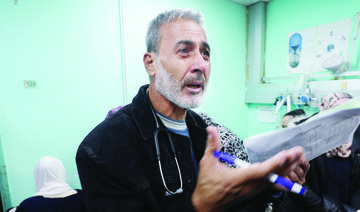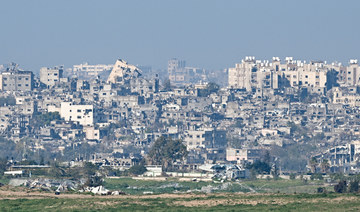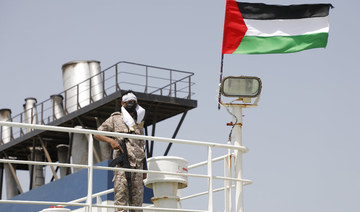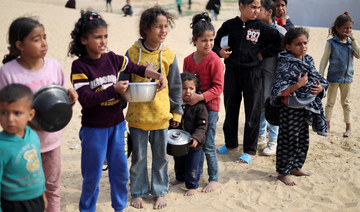JERUSALEM: When Fatima, an Arab Israeli married to a Palestinian from the Gaza Strip, fled Israel’s bombardment of the territory, she was terrified they would run out of fuel.
“We feared that the gas wouldn’t be enough. The road was deserted. All the way along, we saw devastated houses,” the 30-year-old said, speaking under a pseudonym.
Fatima left on the “very perilous” journey from Al-Qarara in southern Gaza to the Rafah crossing with Egypt on Nov. 14 alongside her 18-month-old and four-year-old children.
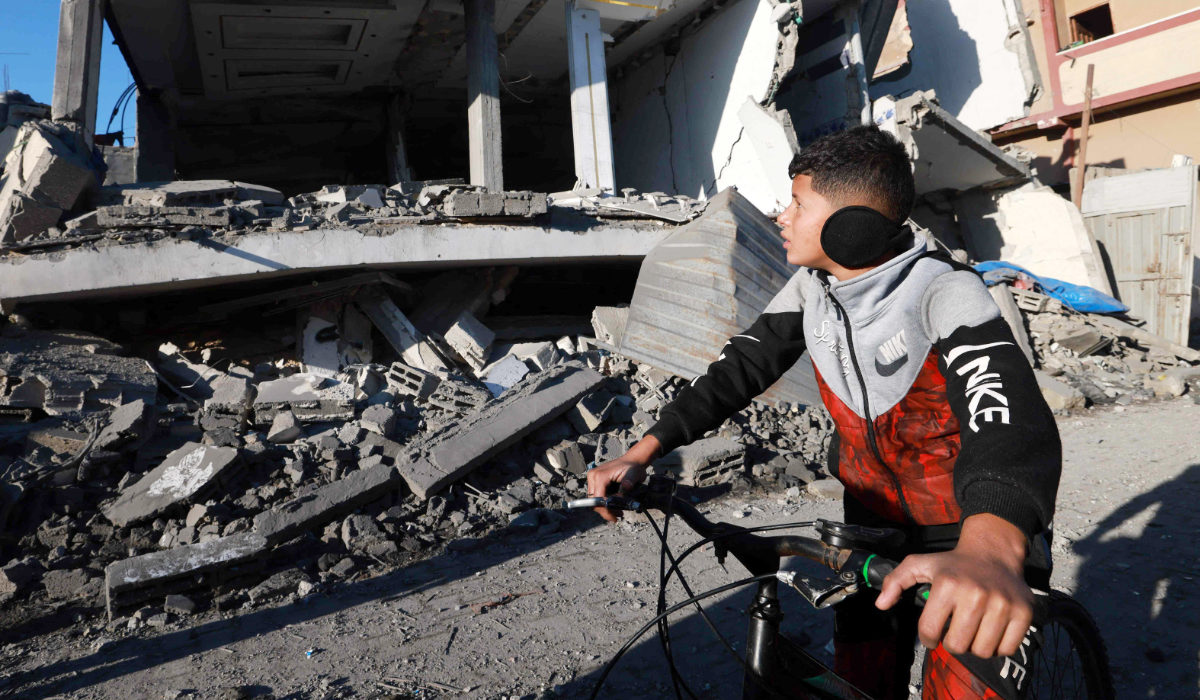
A child stares at the rubble of a building destroyed by Israeli bombardment on Rafah in the southern Gaza Strip on February 4, 2024, as fighting continues between Israel and the Palestinian Hamas group. (AFP)
After hours of waiting, a bus took them across the Sinai desert to the Egyptian town of Taba, before reaching Eilat, on Israel’s Red Sea coast.
The 48-hour trip was organized by the Israeli human rights organizations Gisha and HaMoked, which have evacuated 71 Arab Israelis so far.
Arab Israelis are those Palestinians and their descendants who remained in Israel following the first Arab-Israeli war and the creation of the State of Israel in 1948.
The majority of the Palestinian population, around 760,000 people, was forcibly displaced during the conflict, in what they call the Nakba or catastrophe.
According to Israel’s Central Bureau of Statistics, there are more than 2 million Arab Israelis today, accounting for 21 percent of the population.
That figure includes the population of East Jerusalem, whose annexation by Israel is not recognized by the UN.
In Gaza, Fatima initially hesitated to leave her husband, but he encouraged her to go to protect their children.
She described a journey filled with anxiety and under bombardment. Once in Eilat, she and everyone else over the age of 16 spent hours being questioned and searched, Fatima said. Fatima said she was interrogated about her relatives, the situation in the Gaza Strip and whether she knew anything about Hamas tunnels and headquarters in the territory.
“They questioned me about my view on Oct. 7 attacks, about my husband and his work. They ordered me to open my phone to examine my photos, calls and messages,” she said. Hanan, 37, made the same journey as Fatima, along with her mother.
Both have Israeli passports and traveled to the Rafah crossing from Nuseirat in central Gaza.
She said the journey, punctuated by bombardments, “was terrifying.”
In Eilat, “the young people were searched three times ... then they began interrogating us one by one. There was psychological pressure, but I was reassured because I had nothing to do with what happened” on Oct. 7, she said.
In Gaza, Fatima said she had endured “electricity cuts, water cuts and deserted businesses.”
She survived “36 days thanks to canned food and drinking salty water. The solar panels were barely enough to charge the phones.”
Fatima is now living in an Arab town in Israel, but said it was difficult starting a new life, with her children “scared by the sound of every plane or thunder.”
According to the Gisha NGO, 15 percent of Gazans have family ties to Israeli citizens or Palestinians in east Jerusalem.
However, “hundreds of people with legal status in Israel cannot leave (Gaza), either due to fear of travel or refusal to leave behind non-Israeli spouses and children,” said Gisha spokeswoman Shai Grunberg.
Together, Gisha and HaMoked are engaged in a complex process of coordination with those eligible to leave for Israel.
Grunberg gave as an example the case of a woman with Israeli citizenship who cannot bring her three children with her.
The problem, she said, was that the children were not on Israel’s population register. The authorities had “requested a genetic test to prove their relationship,” she said, but doing so is impossible given the war in Gaza.
Hanan’s family, meanwhile, have left for another Arab country. “Every day, I fall asleep in tears. We survived the war, but we are destroyed psychologically,” she said.




